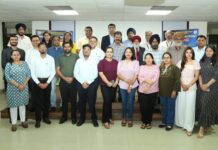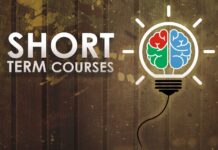English Phonetics and Phonology study the sounds of the English language. Phonetics focuses on the physical production and acoustic properties of speech sounds, examining articulation and sound waves. It categorizes sounds into vowels, consonants, and their variations. Phonology, on the other hand, explores the systematic organization and patterns of sounds within a language, including the study of phonemes and their distribution. Understanding the relationship between phonetics and phonology is crucial for grasping pronunciation nuances and language variation. Both disciplines play a fundamental role in language acquisition, linguistic analysis, and improving communication skills in English. In this context, Department of English, School of Liberal and Creative Arts (Social Sciences and Languages) in collaboration with Human Resource Development Center, Lovely Professional University conducted a Short-term course on English Phonetics and Phonology w.e.f April 22, 2024 to April 27, 2024.
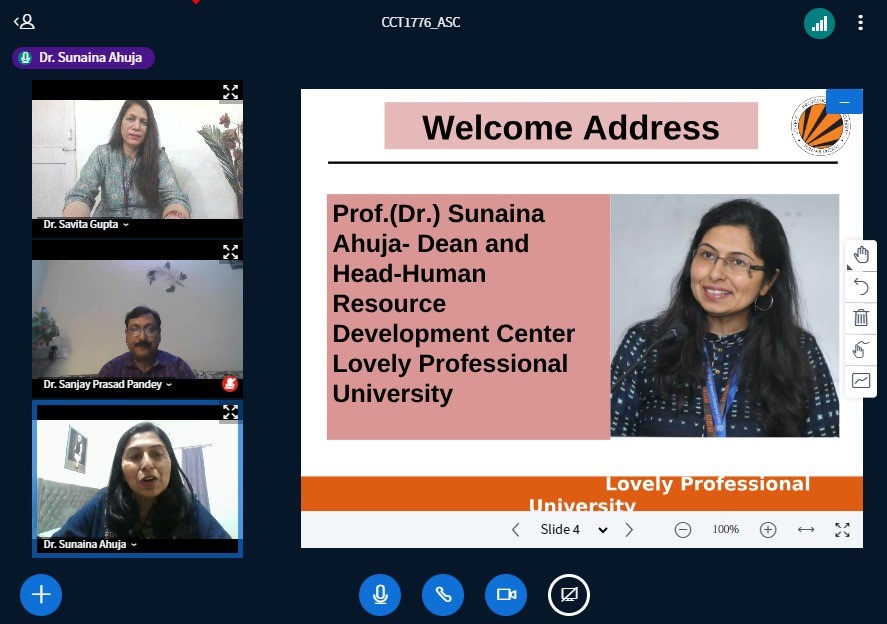
The course aimed at developing the understanding and skill in the production of speech sounds, long vowels, diphthongs, and triphthongs, analysing the vowels and consonants, examining the English phoneme and phonology and adapt the aspects of connected speech, stress, intonation, and syllables.
Dr. Sunaina Ahuja, Professor and Dean, Head-Human Resource Development Center (HRDC), LPU the convener of the program, warmly welcomed the participants and mentioned that this program will equip participants with the essential skills and knowledge of English phonemes and phonology. Moreover, she expressed confidence that the course’s deliberations, case-based teaching and demonstration will help participants to develop tangible skills in studying the sounds in English, analyze their production, distribution, and perception, and will explore how sounds combine to form words, sentences, and convey meaning in communication.
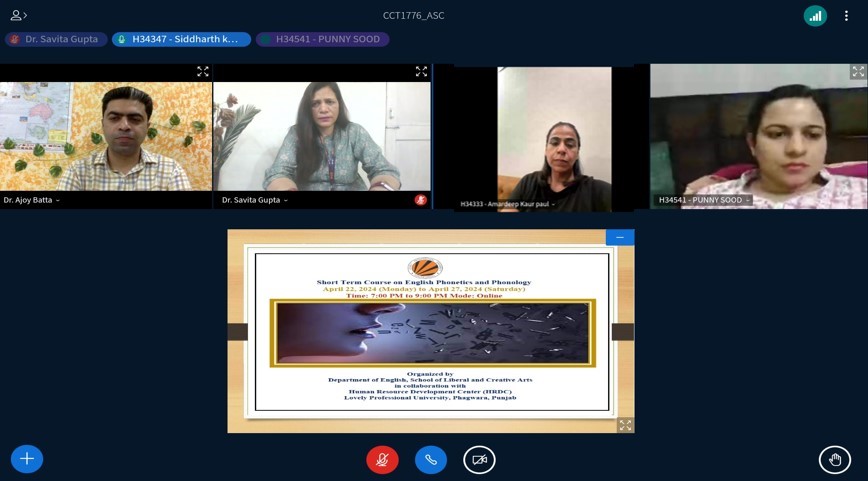
The resource panel included Dr. Ajoy Batta, Professor and Head, Department of English, LPU and Dr. Sanjay Prasad Pandey, Professor, Department of English, LPU. Day-wise key highlights of the program are appended below
Day 1: Embarking on the Journey of Speech Sounds
Under the expert guidance of Dr. Ajoy Batta, participants embarked on an enlightening journey into the production of speech sounds. Dr. Batta’s extensive knowledge and engaging teaching style illuminated the intricate process of producing sounds in speech, laying a solid foundation for the week’s exploration of English phonology.
Day 2: Exploring Vowel Variations
On day 2 participants were immersed in a captivating session by Dr. Batta he delved deep into the realm of long vowels, diphthongs, and triphthongs. Participants were guided through a comprehensive analysis of the subtle nuances and variations within these vowel categories, enriching their understanding of English pronunciation.
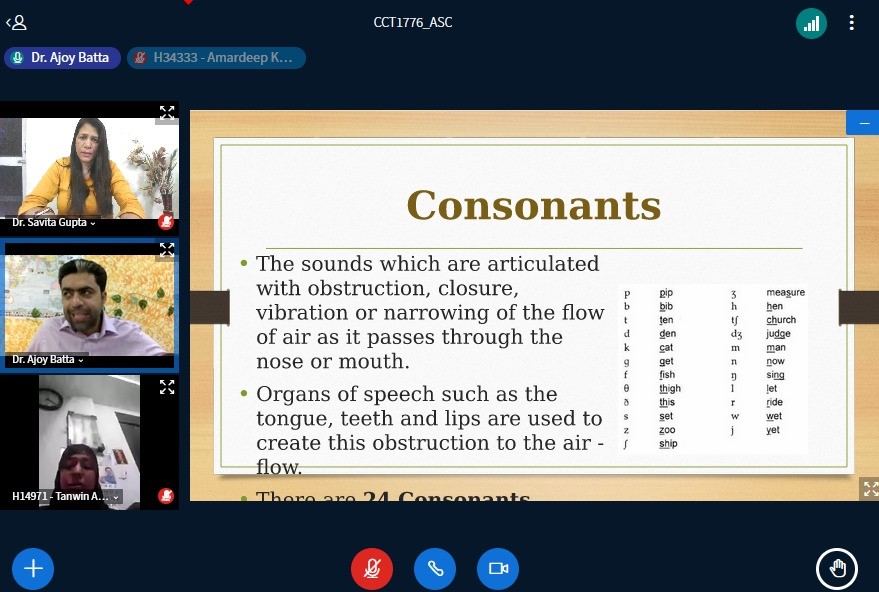
Day 3: Unraveling the Intricacies of Consonants and Voicing
On day 3 Dr. Sanjay Prasad Pandey deliberated on phonetics, specifically, he focused this session on voicing and consonants. Through engaging discussions and interactive activities, participants delved into the intricate principles of governing the production and classification of consonant sounds based on voicing, deepening their grasp of phonetic concepts.
Day 4: Deciphering the Significance of Phonemes
The focus shifted to the foundational concept of the Phoneme on Day 4, conducted by Dr. Sanjay Prasad Pandey, participants engaged in analytical discussions under expert guidance, unravelling the significance of phonemes as the fundamental units of sound in language and their crucial role in distinguishing meaning in communication.
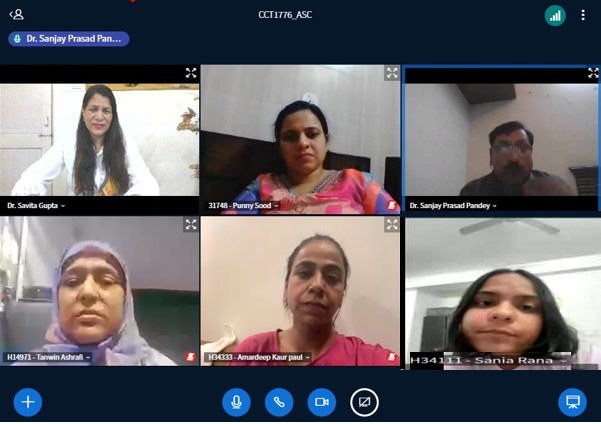
Day 5: Mastering Consonant Articulation Techniques
On day 5 with Dr. Ajoy Batta, participants embarked on a comprehensive exploration of fricatives and affricates, nasals, and other consonants. Guided by Dr. Batta’s expertise, participants gained valuable insights into the articulation techniques and phonetic characteristics of various consonant sounds, enriching their understanding of English phonology.
Day 6: Insights into Intonation and Connected Speech
In the culminating session of the week, Dr. Sanjay Prasad Pandey returned to lead participants through an insightful discussion on the syllable, strong and weak, intonation, and aspects of connected speech. Through engaging activities and enlightening discourse, participants delved into the rhythmic patterns of speech and the nuanced ways in which intonation shapes meaning, culminating in a profound understanding of English phonology.
Subject Matter Experts (SMEs) strategically included a blend of theoretical instructions, and practical demonstrations ensuring participants gained a comprehensive understanding of the topics covered and fostering an engaging and interactive learning environment. Post-training evaluation serves a crucial role in gauging the efficacy of the STC. Two types of post-training evaluation both quiz and project were assigned. Participants were asked to submit assignment: 1. How different organs are responsible for speech. Explain with examples. 2. Distinguish between phone, phoneme and allophone with examples and 3. Explain air‐stream mechanisms with an illustration.
Dr. Savita Gupta, Professor, Head-Department of Faculty Development coordinator of the program applauded the resource persons and organizing team for conducting a meaningful short-term course, successful in meeting participants’ expectations. Co-coordinator of the program Dr. Ajoy Batta, Professor and Head Department of English, School of Liberal and Creative Arts (Social Sciences & Languages), LPU proposed a formal vote of thanks. Feedback was solicited from the participants in response to which they appreciated the gesture shown by the LPU-HRDC in terms of choice of Subject Matter Experts and curriculum framed to make us clear about the production of speech sounds, long vowels, diphthongs, and triphthongs, analysis of vowels and consonants and examine the English phoneme and phonology.



